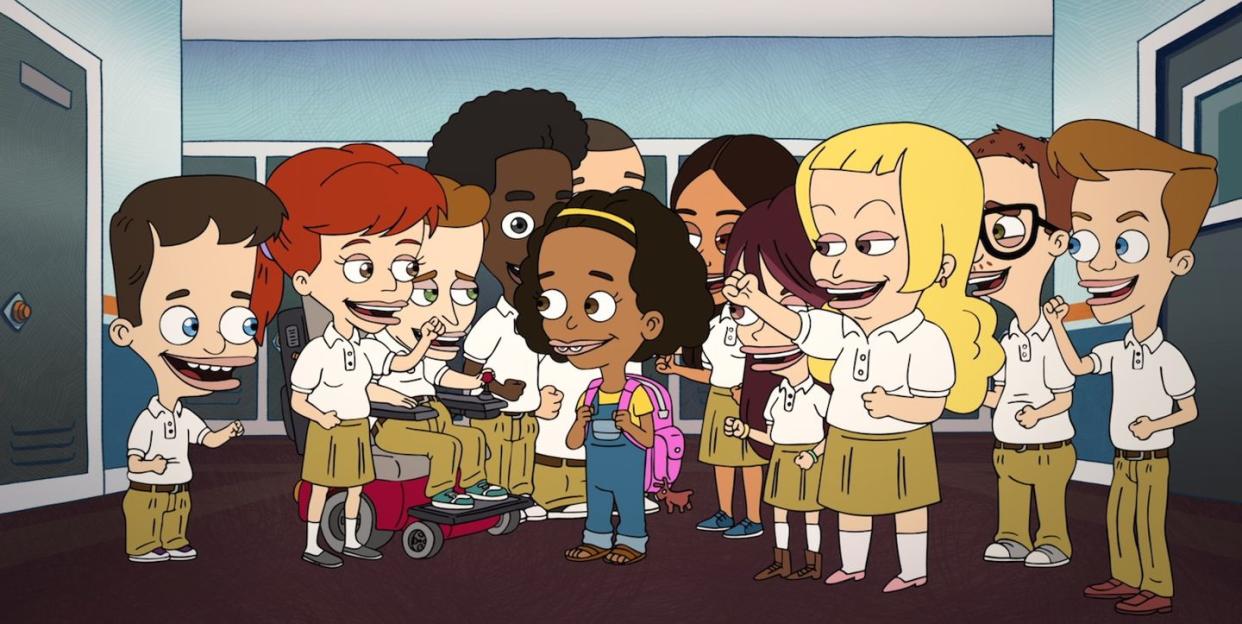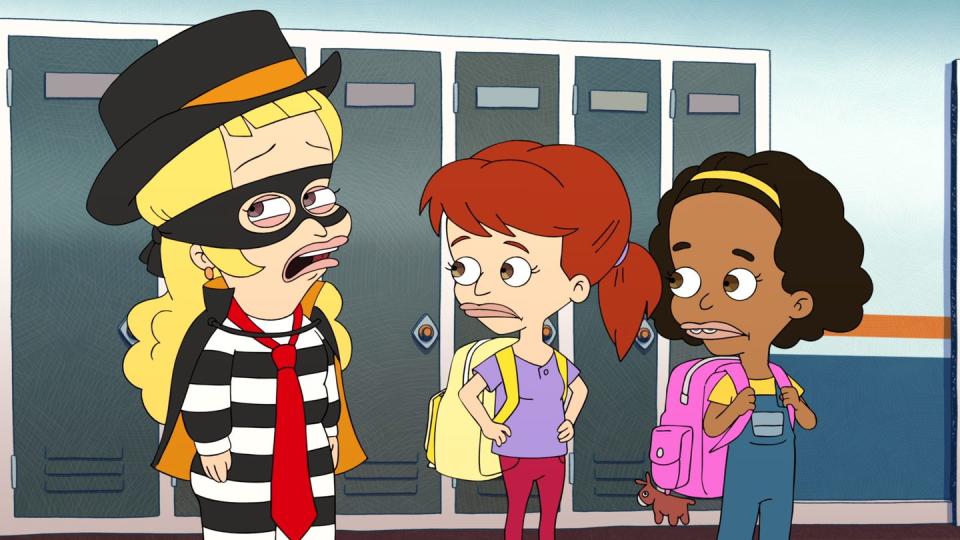'Big Mouth' is Telling #MeToo Stories Better Than Any Other Show on TV

Remember after school specials? Informative and educational, they ruled the after school television block for a quarter of a century, aiding thousands of young people in fine-tuning their developing sense of morality. Groundbreaking as they were in tackling thorny subjects like eating disorders and substance abuse, they earned a reputation as preachy, prescriptive, and sometimes hokey.
In Netflix’s Big Mouth, after school specials have finally found a worthy successor. Yet there’s nothing preachy about Big Mouth—instead, it’s an after school special for the twenty-first century, sucking the moralizing out of the formula to instead combine insightful commentary about formative, zeitgeist-y challenges with side-splitting humor. In its home run of a third season, Big Mouth lasers in on the #MeToo movement, delivering stories at once thoughtful and uproarious about issues familiar to anyone who’s ever been a middle-school girl, including toxic masculinity, rape culture, and internalized misogyny. Yet in a crowded field of television shows wrestling with the #MeToo movement, Big Mouth doesn’t stop there—it also considers the male side of the equation, investigating how men can feel at a loss to understand the conflicting desires of women.
The season three premiere, “Girls Are Angry Too,” picks up two weeks after the season two finale, which saw a jealous Andrew, heartbroken over his break-up with Missy and enraged by what he perceives as her budding romance with wheelchair-bound Lars, drag Lars out of his wheelchair in a misguided attempt to prove that Lars can walk. After two weeks of well-deserved exclusion, Andrew makes a grandiose entrance to shop class with an announcement: “I have a brief statement. These past two weeks have been a difficult but very necessary learning experience for me. And frankly, I’m ready to rejoin the middle school community and pretend that none of this ever happened.” Sounds familiar, right? Andrew’s side-stepping of consequences and refusal to soul-search come straight out of the non-apology playbook for disgraced but unrepentant men.
Shop class takes a gruesome turn when perpetually sex-crazed Jay, driven to manic distraction by his abstinence from masturbation, saws off Andrew’s fingertip while spaced out in a characteristically weird fantasy involving his female classmates animorphing into sexualized turkeys. Cut to the principal’s office, where Andrew and Jay’s parents have been summoned for a meeting. Jay’s father, a sleazy lawyer who specializes in discount divorces for reprehensible men, argues that the accident was the fault of the girls, who distracted Jay because they dress “like whores.” What follows are twenty-some exemplary minutes of television, which manage to yoke knotty ideas about toxic masculinity and slut-shaming together with the phrase, “Eat your own ass!”
Mr. Lizer, the odious, patronizing dean of student life, calls a school assembly to discuss toxic masculinity. Lizer indoctrinates the students into an all-too familiar narrative: boys are animals powerless to control their sexual urges, and it’s the responsibility of girls to protect themselves from the beastly behavior of boys. Big Mouth keenly highlights how such hand-waving inoculates boys from admitting responsibility or accepting consequences, allowing them to respond as Andrew does: “I do feel out of control all the time, and I think I’m going to use that as an excuse for my actions.”
When burgeoning feminist Jessi speaks up about toxic masculinity, Lizer silences her with an admonishment, turning the language of the #MeToo movement around on her: “Jessi, now’s the time to listen.” To protect the girls from the “white hot male gaze,” Lizer implements a dress code forbidding “leggings, jegging, short skirts, short shorts, tank tops, crop tops, halter tops, and tramp stamps.” When Missy rightly notes that the dress code targets only girls’ clothes, Lizer turns the spotlight on her, proclaiming that her modest overalls are the ideal of sexless female attire. In comparing Missy to a Despicable Me Minion, Lizer gets at a tightrope that women are all too accustomed to walking: be sexy, but not too sexy, but not too unsexy, either.
When the girls band together to protest the dress code with a Slut Walk, Nick’s older sister encourages him to be an ally, but Nick whines in response, “I don’t want to be the guy that tells other guys they’re being misogynistic.” Nick’s apathetic bystander attitude calls to mind the mentality of milquetoast would-be allies, who crave a pat on the back, but refuse to put in the work. However, Nick isn’t the only one with misgivings about the Slut Walk—although she’s the mastermind behind it, Jessi worries that she’s objectifying herself through the protest.

With a catchy song-and-dance number in which the boys sexualize the protest and slobber over the enraged girls, the Slut Walk ends in disaster. Missy opts out of wearing revealing clothing, arriving late in her standard overalls with a protest sign, only for Lola and the girls to label her a traitor to her gender. Nick takes a stand as his sister suggested, but fails to stick the landing, alienating himself from the boys and girls alike. As punishment, Lizer implements loathsome, scratchy uniforms.
Andrew, seemingly an incel in the making, livestreams a rant: “What do women want? There was this girl, and I tried being the sweet guy they’re always saying they want, and she dumped me!” He seeks guidance from a gathering of men’s rights activists, which turns out to be a neo-Nazi meeting. Staggered by their hatred, a transformed Andrew weeps in Nick’s arms, admitting that he overreacted to Missy’s rejection: “I thought that I was the victim, but now I think that I’m the asshole.” Andrew's arc reflects how hamstrung modern men are by their own lack of emotional intelligence, and just how forlorn their lack of emotional vulnerability can leave them.
Missy saves the day with a protest of her own, forgoing her uniform in favor of her overalls and sticking it to Lizer with an iconic outburst: “Eat your own ass!” When the girls cheer her on, Missy brands them hypocrites, reminding them that they shamed her for her outfit. Missy’s admonition of the girls evokes the complicated messaging girls absorb about the right and wrong way to be a feminist, and the painful work of policing one another’s feminism. When Andrew piles on, she turns her explosive rage on him in a line that will resonate with any woman who’s ever suffered the histrionics of an aggrieved ex-boyfriend: “We went out for like five fudging days. I don’t owe you squat diddly. Get over it!”
The trials of Bridgeton Middle School’s female students come to a head with the school musical, Disclosure the Movie: The Musical, adapted from a 1994 film starring Michael Douglas as a middle manager falsely accused of sexual harassment by his female boss, played by Demi Moore. “Beware! Pretty women want our jobs!” shouts an animatronic boss in the opening number. While Jessi condemns the musical as “a misogynistic fantasy,” Lizer adopts the sanctimonious, ‘woe is me’ language of #MeToo critics who claim that these are dark days for men: “Disclosure the Musical is an exploration of the dangerous times that we men are now forced to navigate. This play dares to harass the very notion of sexual harassment and say, ‘Yeah! Me Too!’”
Paging through the script, the girls are dismayed by their offensive, one-note parts. Jessi is cast as “Dutiful Wife,” who trills in her solo, “Standing by her husband is a woman’s job.” In a smart stroke of intersectional feminism, Latina student Gina is disgusted to be cast as “Senorita Cleaning Lady,” while Asian student Ali is “Hot Asian With Asian Boobs.” When Gina and Ali call Lizer out, demanding an explanation for the offensive roles, Lizer’s response is simply, “Because diversity.” When the girls quit the musical in protest and Missy opts to stay in the lead role, promising to effect change from within, Jessi is quick to shame Missy in another insightful subplot about girls policing the feminism of other girls.
Missy leans all the way into her lead role, embracing the thrill of her sexual awakening under the tutelage of a seductive new hormone monstress. She learns to use sex appeal as a weapon against Lars and Nick, oozing flirtatious energy and refusing to remain a people-pleaser. Missy’s embrace of her sexuality recalls “How to Have an Orgasm,” another exemplary episode of the third season in which Jessi, too, learns to embrace her sexuality. Jessi struggles with embarrassment and internalized shame about her inability to have an orgasm, only to learn how to masturbate successfully in a Tomb Raider fantasy about the treasure of pleasure, fueled by a trusty electric toothbrush.
Meanwhile, Lizer enlists Lola as Disclosure the Musical’s stage manager, insisting that they share a “special relationship.” What follows is a fascinating arc about how men gaslight the women they abuse, which sees Lizer demand a titillating foot rub from Lola, convince her that it was her idea, then accuse her of inappropriate behavior when she voices her trepidation. When Lola turns Lizer into the principal and the musical is abruptly cancelled, an enraged Lizer shouts, “This is another example of women using sexual harassment to destroy good men.”
In a season of standout moments, the most standout moment of all occurs when an infuriated Jessi vents to Nick about the challenges of being a girl: “You don’t get it. You don’t know what it’s like being a girl. People tell you what to wear, the whole world is telling you how big your boobs should be, and you called us sluts!” Nick, at a loss, responds, “I’m on your side. I just literally don’t know what to do.” An exasperated Jessi responds, “I don’t know exactly either. I think it might just be this long conversation that we all have to keep having.”

That, there, is the heart of it. Gender and sexuality are an ongoing negotiation, not a subject with a tidy, correct answer. Big Mouth itself is an exceptional foray into that conversation--a show that neither moralizes nor condemns, but instead explores the agony and the ecstasy of this awkward, interminable, important conversation. Big Mouth explores that subject from within and without, tackling the internal struggle of defining our sexuality and our sexual politics, as well as the external work of doing right by the struggles of others.
Other shows exploring similar subjects include Bojack Horseman, which addresses the propensity of Hollywood and society writ large to invite abusers back into public life. There's also Jane the Virgin, which sees Jane confront her assumptions about a sleazy professor who sleeps with students. There's Brooklyn Nine-Nine, which highlights the ability of women to disagree about feminism and moral compromise. There's Shrill, which tackles fat-shaming and misogynistic trolls, and there's Unbelievable, with its remarkable story about rape culture and miscarriages of justice. Even The Bachelor has joined the conversation with a moving, sensitively handled discussion between the bachelor and a contestant who confided in him about the ongoing psychological impact of her traumatic sexual assault.
Yet what other shows are doing exceedingly well with adults, Big Mouth does backwards and in high heels with children. Where adults like Bojack Horseman and Jane Villaneuva wrestle with right and wrong, the kids of Bridgeton Middle School must do the same while grappling with their nascent identities, sexualities, and senses of morality. Big Mouth's middle schoolers are equipped with far fewer tools than adults, which leaves them flailing in the relative moral dark. The show gives them ample room to get it wrong, as well as the grace to grow and change. Yet in these very special episodes, Big Mouth never veers into Very Special Episode territory. Leave it to a bunch of cartoon tweens to nail grown-up problems better than anyone.
You Might Also Like

